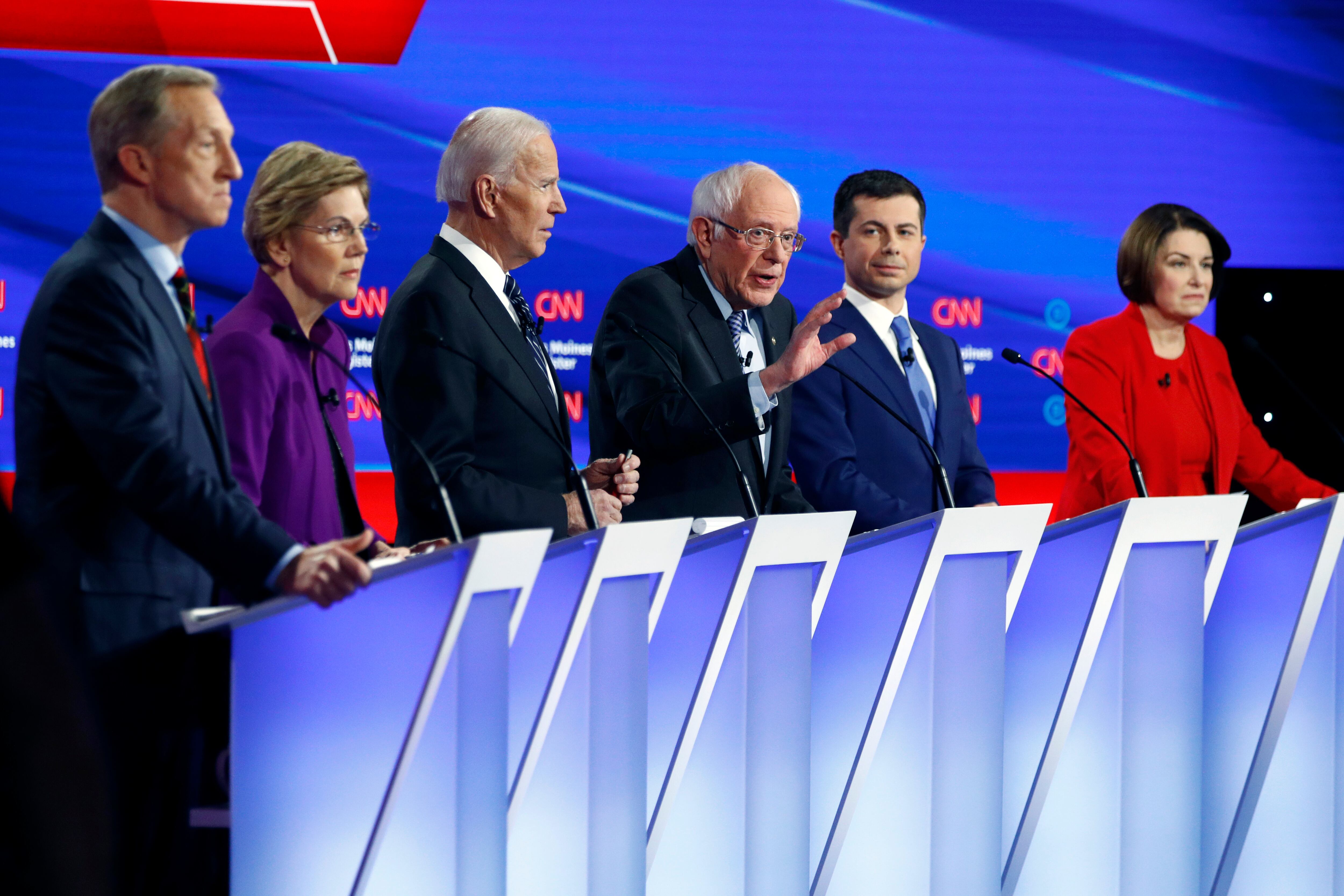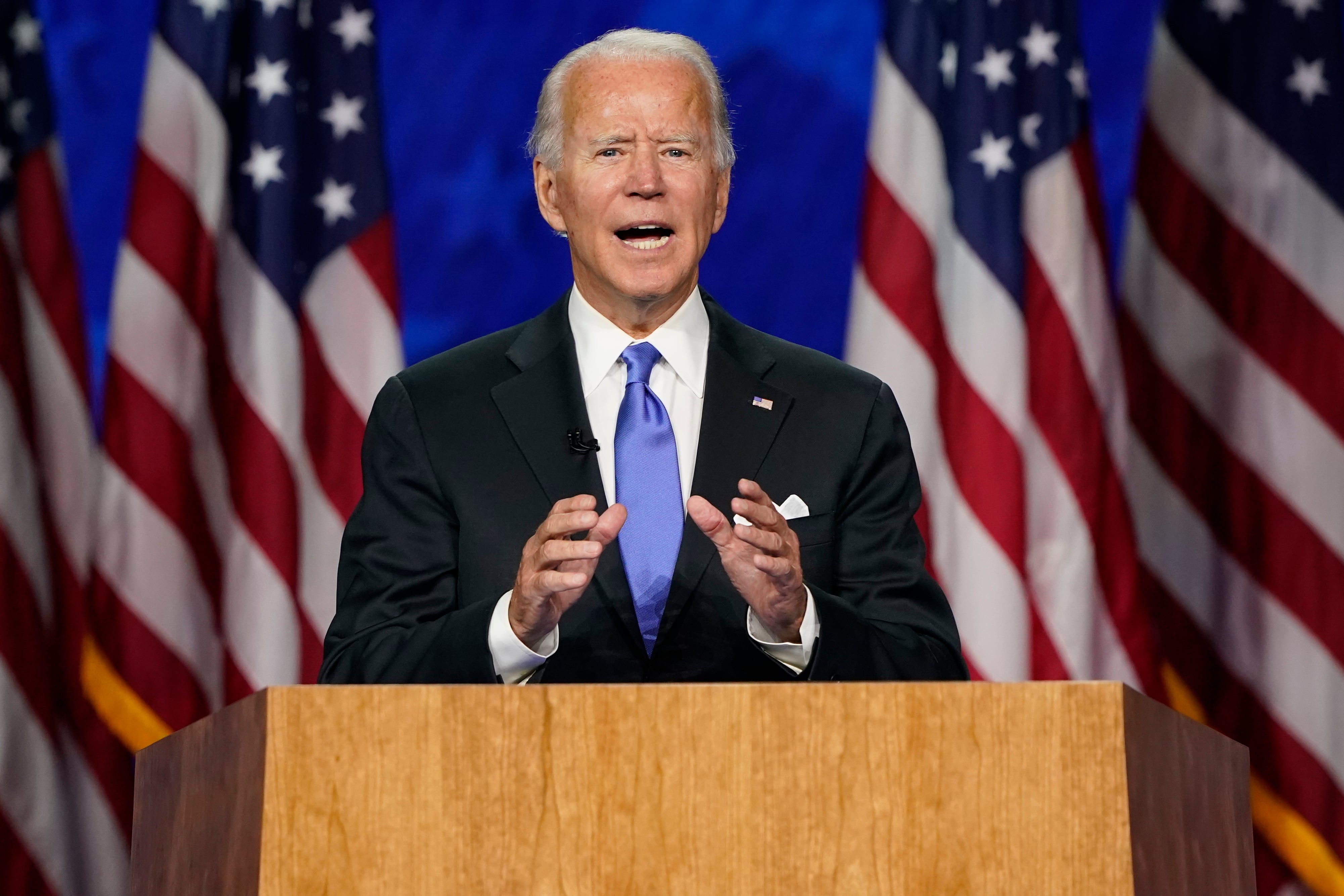WASHINGTON ― Former Vice President Joe Biden said this week that, if elected president, he doesn’t foresee major reductions in the U.S. defense budget as the military refocuses its attention to potential threats from “near-peer” powers such as China and Russia.
But internal pressure from the progressive wing of the Democratic Party, combined with pandemic-related economic pressures, may ultimately add up to budget cuts at a Biden Pentagon.
In an interview with Stars and Stripes on Thursday, Biden avoided any sweeping pronouncements about how defense spending might change in his administration. “I don’t think [budget cuts] are inevitable, but we need priorities in the budget,” Biden said, adding that the Pentagon must invest in emerging technologies.
“We have to focus more on unmanned capacity, cyber and IT, in a very modern world that is changing rapidly,” Biden said. “I’ve met with a number of my advisors and some have suggested in certain areas the budget is going to have to be increased.”
Biden vowed to better equip the National Guard and that he would work to reassure allies rattled by his opponent’s “America First” approach. He said he backs a small footprint for U.S. troops in the Mideast, but couldn’t promise a full withdrawal given the complicated conditions in Syria, Afghanistan and Iraq.
“These ‘forever wars’ have to end. I support drawing down the troops. But here’s the problem, we still have to worry about terrorism and [the Islamic State],” Biden said, adding that there ought to be a maximum of 1,500-2,000 special forces troops in Afghanistan for counter-terrorism operations.
As President Donald Trump campaigns for a second term and tries to make good on his promise to get America out of “endless wars,” the Pentagon announced this week that thousands of troops will withdraw from Iraq and Afghanistan. Trump has overseen historic increases in U.S. defense budgets, but also tested U.S. alliances with his aggressive emphasis on burden-sharing.
Though both Democrats and Republicans placed “sequestration” limits on defense spending, Trump and other critics have associated those limits, and downward pressure on defense budgets, with President Barack Obama. Left-wing Democrats credit Biden for the Democratic Party’s 2020 platform’s promise to “end the forever wars” and champion less militarized foreign policy, but the platform skirts the question of whether to lower defense spending.
Progressives in Congress have ramped up a campaign to reprioritize spending away from the military and in favor of healthcare, education and jobs, arguing that massive spending on national security didn’t keep the country safe from COVID-19.
"The United States spends more on defense than any other country on earth, but we still failed to invest in any of the basic science needed to protect ourselves from COVID-19,” California Democratic Rep. Ro Khanna, a progressive on the House Armed Services Committee said in a recent tweet.
For some analysts, Biden’s comments were nothing shocking, and just an affirmation of what they have seen coming: Defense spending will be flat or down 4-8 percent over the next five years, depending on external political factors and the makeup of Congress.
“Democratic candidate Joe Biden told Stars and Stripes he isn’t planning for major defense spending cuts and some areas may need to increase,” analyst Roman Schweizer, of Cowen Washington Research Group said in a letter to investors Friday. “We don’t see this as an ironclad campaign pledge, but we do see it as a sign that defense may be far less worse-off than many expect.”
One of those external factors is the U.S. budget deficit, which hit a record $3 trillion this week, fueled almost entirely by increased federal spending due to the pandemic. But the indicator to watch will be interest rates, since rising borrowing costs for the government would make it harder for the Pentagon to sustain spending growth, said Avascent analyst Matthew Vallone.
More than the economy, the likely risk to defense spending will come from Congress. Should Biden propose defense top lines that are level, or feature minor reductions, he could see pushback from “a significantly stronger far left and Republicans anxious to restore credibility on deficits by opposing spending,” Vallone noted.
If Democrats take the Senate, Vermont Independent and longtime defense spending skeptic Sen. Bernie Sanders is in line to take the chairmanship of the Senate Budget Committee, and “it’s difficult to see top lines getting through his committee unscathed,” Vallone said.
RELATED

Biden is already under pressure from the progressive wing of his party, which mounted a test vote in the Senate (sponsored by Sanders), and one in the House, to cut the defense budget by 10 percent. Though the votes failed resoundingly and split Democrats, advocates of restraint argue that public sentiment is on their side and have cited an urgent need to rebuild the economy in the wake of the coronavirus pandemic.
In a power flex, progressives won support from high-profile Senate Minority Leader Chuck Schumer, D-N.Y., who had previously voted for every defense budget under the Trump administration, but arguably faces a more liberal electorate of late. That was one sign of the pressure, beyond Biden, on Democrats in Congress, where the power of the purse actually lies.
Just a week earlier, a similarly hawkish and prominent House Foreign Affairs Committee Chairman Eliot Engel, D-N.Y., was unseated in his Democratic primary by Jamaal Bowman, a liberal challenger who attacked Engel’s support for the Iraq War and opposition to the Iran nuclear deal. Bowman’s website highlights Engel’s campaign contributions from defense contractors like Raytheon and says, “we need someone focused not on finding money for bombs and bullets, but for schools, health care and jobs.”
Matt Duss, a Sanders foreign policy aide, said Biden’s team has engaged with a progressive wing that’s energized around reshaping U.S. foreign policy.
“You have a progressive movement in the party now that is really motivated and mobilized around foreign policy and national security issues, and that’s not going away,” Duss said. “That is something a President Biden will have to work with, and I think his team understands that ... This debate will be different under the next Democratic administration from the last one.”
Whomever occupies the White House, they will face public pressure to withdraw from Syria and Iraq and pressure from the foreign policy establishment to stay, said Daniel DePetris, of the Defense Priorities Foundation. He argued that view is not only outmoded because America’s energy boom has made the Mideast less strategically important, but it’s out of step with American voters.
“For years, polling has indicated that the American people no longer view these wars as necessary for U.S. security and indeed find them quite costly,” he said. “Were a president to wind down some of these conflicts, he would likely have the support of the public.”
Joe Gould was the senior Pentagon reporter for Defense News, covering the intersection of national security policy, politics and the defense industry. He had previously served as Congress reporter.





